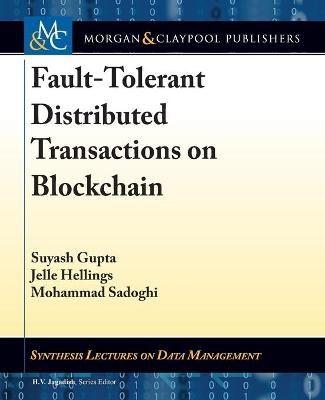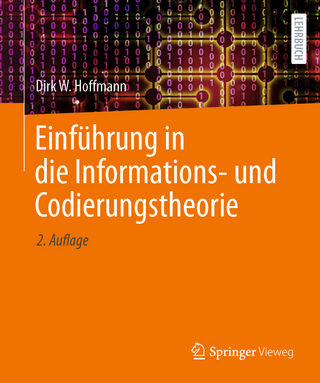
Fault-Tolerant Distributed Transactions on Blockchain
Morgan & Claypool Publishers (Verlag)
978-1-63639-059-8 (ISBN)
- Lieferbar
- Versandkostenfrei
- Auch auf Rechnung
- Artikel merken
Since the introduction of Bitcoin--the first widespread application driven by blockchain--the interest of the public and private sectors in blockchain has skyrocketed.
In recent years, blockchain-based fabrics have been used to address challenges in diverse fields such as trade, food production, property rights, identity-management, aid delivery, health care, and fraud prevention. This widespread interest follows from fundamental concepts on which blockchains are built that together embed the notion of trust, upon which blockchains are built.
1. Blockchains provide data transparancy. Data in a blockchain is stored in the form of a ledger, which contains an ordered history of all the transactions. This facilitates oversight and auditing.
2. Blockchains ensure data integrity by using strong cryptographic primitives. This guarantees that transactions accepted by the blockchain are authenticated by its issuer, are immutable, and cannot be repudiated by the issuer. This ensures accountability.
3. Blockchains are decentralized, democratic, and resilient. They use consensus-based replication to decentralize the ledger among many independent participants. Thus, it can operate completely decentralized and does not require trust in a single authority. Additions to the chain are performed by consensus, in which all participants have a democratic voice in maintaining the integrity of the blockchain. Due to the usage of replication and consensus, blockchains are also highly resilient to malicious attacks even when a significant portion of the participants are malicious. It further increases the opportunity for fairness and equity through democratization.
These fundamental concepts and the technologies behind them--a generic ledger-based data model, cryptographically ensured data integrity, and consensus-based replication--prove to be a powerful and inspiring combination, a catalyst to promote computational trust. In this book, we present an in-depth study of blockchain, unraveling its revolutionary promise to instill computational trust in society, all carefully tailored to a broad audience including students, researchers, and practitioners. We offer a comprehensive overview of theoretical limitations and practical usability of consensus protocols while examining the diverse landscape of how blockchains are manifested in their permissioned and permissionless forms.
Suyash Gupta is pursuing doctoral research at the Computer Science Department at University of California, Davis. At UC Davis, he is a senior member of Exploratory Systems Lab and works under the supervision of Prof. Sadoghi. He also works as the Lead Architect at the blockchain company Moka Blox. Prior to joining UC Davis, he started his doctoral research at the Department of Computer Science at Purdue University. He earned a Master of Science degree from Purdue University in 2017 and transferred to UC Davis to complete his research. He also received a Master of Science (Research) degree from Indian Institute of Technology Madras in 2015. His current research focuses on attaining safe and efficient, fault-tolerant consensus in distributed and blockchain applications. He also has published works that present efficient optimizations and design for parallel and distributed algorithms. In his free time, Suyash likes to code and has won awards at several hackathons. Jelle Hellings is currently a Postdoc Fellow in the Exploratory Systems Lab led by Prof. Sadoghi at UC Davis. Since 2018, his work focusses on exploring the theoretical limitations of future high-performance resilient data processing systems, this with the aim of exploring new directions for data processing in malicious environments. Jelle Hellings studied Computer Science and Engineering at the Eindhoven University of Technology, Netherlands. At the TU/e, he finished his graduate studies with a research project focused on external memory algorithms for indexing data that can be represented by trees or directed acyclic graphs. The results of which were presented at SIGMOD 2012. Following, he moved to Hasselt University, Belgium, to pursue his doctorate at the Databases and Theoretical Computer Science research group. There, his main focus was on the study of the expressive power of graph query languages. Furthermore, he also studied constraints for semi-structured data, graph querying via walks and via context-free languages, counting-only queryes, and temporal join algorithms. Mohammad Sadoghi is an Assistant Professor in the Computer Science Department at the University of California, Davis. Formerly, he was an Assistant Professor at Purdue University and Research Staff Member at IBM T.J. Watson Research Center. He received his Ph.D. from the University of Toronto in 2013. He leads the ExpoLab research group with the mission to pioneer a resilient data platform at scale, a distributed ledger centered around a democratic and decentralized computational model (ResilientDB Fabric) that further aims to unify secure transactional and real-time analytical processing (L-Store). He envisioned ResilientDB to serve as a platform to foster "creativity." He has co-founded a blockchain company called Moka Blox LLC, the ResilientDB spinoff. He has over 90 publications in leading database conferences/journals and 34 filed U.S. patents. His ACM Middleware'18 paper entitled "QueCC: A Queue-oriented, Control-free Concurrency Architecture" won the Best Paper Award. He served as the Area Editor for Transaction Processing in Encyclopedia of Big Data Technologies by Springer. He has coauthored the book Transaction Processing on Modern Hardware, Morgan & Claypool Synthesis Lectures on Data Management. He regularly serves on the program committee of SIGMOD, VLDB, Middleware, ICDE, EDBT, Middleware, ICDCS, and ICSOC and has been an invited reviewer for TKDE, TPDS, JPDC, and VLDBJ.
Preface
Introduction
Practical Byzantine Fault-Tolerant Consensus
Beyond the Design of PBFT
Toward Scalable Blockchains
Permissioned Blockchains
Permissionless Blockchains
Bibliography
Authors' Biographies
| Erscheinungsdatum | 26.02.2021 |
|---|---|
| Reihe/Serie | Synthesis Lectures on Data Management |
| Verlagsort | San Rafael |
| Sprache | englisch |
| Maße | 191 x 235 mm |
| Themenwelt | Informatik ► Theorie / Studium ► Kryptologie |
| ISBN-10 | 1-63639-059-5 / 1636390595 |
| ISBN-13 | 978-1-63639-059-8 / 9781636390598 |
| Zustand | Neuware |
| Informationen gemäß Produktsicherheitsverordnung (GPSR) | |
| Haben Sie eine Frage zum Produkt? |
aus dem Bereich


